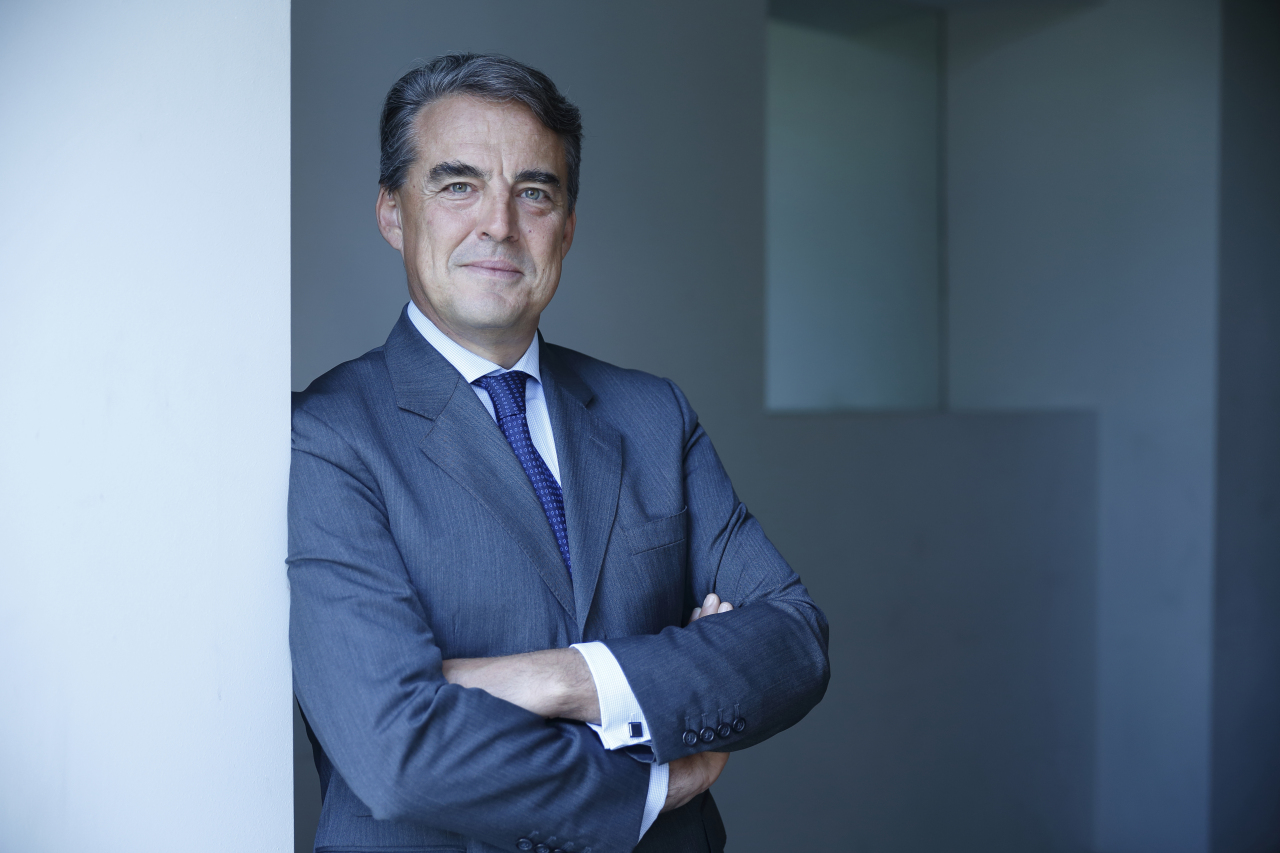[Herald Interview] Korean aviation market important, but has room for regulatory improvement: IATA CEO
By Kim Da-solPublished : May 30, 2019 - 17:25
Although the South Korean aviation market has strength as a transport hub, contributing $47.6 billion to the country’s GDP with 838,000 people working in the industry, the director general and CEO of the global airlines association noted there is still scope for growth if regulations are brought in line with global standards.
Alexandre de Juniac, director general and CEO of the International Air Transport Association, is in Seoul for IATA’s 75th annual general meeting and the World Air Transport Summit, taking place from Saturday to Monday for the first time in Seoul.
Alexandre de Juniac, director general and CEO of the International Air Transport Association, is in Seoul for IATA’s 75th annual general meeting and the World Air Transport Summit, taking place from Saturday to Monday for the first time in Seoul.

Korean Air is the host of this year’s meeting, which will bring some 1,000 market leaders from 290 air carriers together to discuss the future of air transport, in view of the expected doubling of demand for connectivity in the next two decades.
De Juniac, who has held the chief position at IATA since 2016, said Korea was a challenging market and some of its aviation regulations should be aligned with international standards set forth in the 1999 Montreal Convention. Some examples he gave included Korea’s policies on delayed flights and air carriers’ duty to record detailed flight histories on their websites.
Korea’s Aviation Act stipulates that air carriers must compensate passengers in the event of a delay or canceled flight, whereas in the United States there are no federal laws requiring airlines to do so. Each US airline, instead, has its own policies about what it will do for passengers in these situations.
De Juniac also expressed excitement about IATA’s annual general meeting taking place in Seoul for the first time, acknowledging the efforts that the late Korean Air Chairman Cho Yang-ho undertook to make it happen.
“Korea is important for aviation. (There are 13 airlines) and six of them are our members. So it was kind of normal to see Korea hosting the AGM at this stage of aviation development,” he said.
Currently, Korean Air, Asiana Airlines, T’way Air, Eastar Air, Jeju Air and Jin Air are members of IATA.
According to IATA, the number of people working in Korea’s aviation industry is expected to increase to 1.5 billion in 20 years. The country is expected to be among the top 10 passenger markets in 2036, IATA data showed.
“As you know, it’s the 50th anniversary of Korean Air, so it is a good date, at its birthday,” he said, adding that the air carrier was among the best airlines globally.
With regard to Korea’s full-service carriers -- now facing managerial challenges since Cho’s sudden death, the resignation of former Asiana Airlines Chairman Park Sam-koo and the decision to put Asiana up for sale -- de Juniac said they need stable management.
“(The management crisis) is not just among the Korean air carriers but all over the world. We always think air carriers need stable management. Stability, continuity and vision are key elements for managerial teams at air carriers. That is why this it is a very difficult industry. It is very fragile and exposed to risks, including financially,” he added.
The IATA director general and CEO also mentioned the immediate challenges facing the global aviation market this year, despite the profitable market.
“While 2019 is expected to be the 10th consecutive year of airline profits, rising costs, trade wars and other uncertainties are likely to have an impact on the bottom line,” he said.
“So we think that our first duty is to put in place measures to cope with these rising costs that are really harming our profitability and ability to develop our business especially in the Asia-Pacific region, Africa, Middle East and Latin America -- more than in North America, which has still quite good profitability, and Europe, which is, let’s say, in the middle,” he added.
Hinting at the specific analyses and forecasts for the aviation market to be discussed later this week, de Juniac said the general meeting’s agenda would focus on the digital transformation of airlines, infrastructure capacity, sustainability and building a workforce of the future.
Regarding Boeing’s 737 Max, which was grounded globally in March over fatal accidents in Ethiopia and in Indonesia that killed all passengers on board both flights, de Juniac said IATA planned to organize a summit for airlines, regulators and Boeing in five to seven weeks to discuss putting the model back into service.
Adding that no exact time frame had been set yet, he said IATA did not expect its re-entry into service before 10 to 12 weeks, as the matter was in the hands of regulators.
“Under the responsibility of IATA ... (we will be) talking about how to solve this issue, how do we manage the re-entry into service -- in the best possible conditions -- of this aircraft, and restore confidence in the certification process and in this industry, which is the safest industry by far in the world. As you know, we are the safest means of transportation,” he said.
By Kim Da-sol (ddd@heraldcorp.com)









![[Kim Seong-kon] Democracy and the future of South Korea](http://res.heraldm.com/phpwas/restmb_idxmake.php?idx=644&simg=/content/image/2024/04/16/20240416050802_0.jpg&u=)








![[KH Explains] Hyundai's full hybrid edge to pay off amid slow transition to pure EVs](http://res.heraldm.com/phpwas/restmb_idxmake.php?idx=652&simg=/content/image/2024/04/18/20240418050645_0.jpg&u=20240418181020)

![[Today’s K-pop] Zico drops snippet of collaboration with Jennie](http://res.heraldm.com/phpwas/restmb_idxmake.php?idx=642&simg=/content/image/2024/04/18/20240418050702_0.jpg&u=)